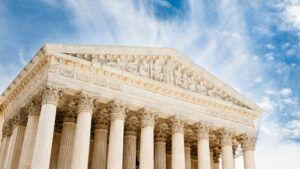How the Pandemic Is Changing Various Aspects of Federal Civil Law
- posted: May 05, 2020
- Uncategorized, Civil Litigation, COVID-19
 Anyone who has followed the news since the coronavirus outbreak hit the United States probably knows that the federal government has taken a wide range of actions to address the pandemic’s human and financial costs. One major piece of legislation, the Coronavirus Aid, Relief, and Economic Security (CARES) Act, has received a great deal of attention due to the funding it provides to individuals, states, healthcare providers, unemployment applicants and employers. However, many other measures have been enacted that might surprise people because the link to COVID-19 doesn’t seem as apparent.
Anyone who has followed the news since the coronavirus outbreak hit the United States probably knows that the federal government has taken a wide range of actions to address the pandemic’s human and financial costs. One major piece of legislation, the Coronavirus Aid, Relief, and Economic Security (CARES) Act, has received a great deal of attention due to the funding it provides to individuals, states, healthcare providers, unemployment applicants and employers. However, many other measures have been enacted that might surprise people because the link to COVID-19 doesn’t seem as apparent.
In addition to the CARES Act and other legislation, various federal regulations have been temporarily revised or are not being enforced in the same manner as before. These actions affect areas such as:
- Federal contracts — For a three-month period beginning in March, the Department of Labor’s Office of Federal Contract Compliance Programs is allowing federal contracts to exclude equal opportunity provisions when necessitated by the “national interest.” According to the department’s release, “This exemption and waiver extends to all affirmative action obligations of supply and service and construction contracts.”
- Immigration — The U.S. Citizen and Immigration Services (USCIS) indefinitely suspended routine immigration services on March 18. This means that offices are closed to the public, and existing appointments, including interviews and naturalization ceremonies, must be rescheduled. Certain emergency services and work that does not involve contact with the public will still be performed.
- Environmental regulations — Citing challenges associated with protecting employees and the public from coronavirus, the Environmental Protection Agency announced that it would cut back on the enforcement of civil environmental regulations. For an indefinite period, businesses that fail to comply with routine monitoring and reporting requirements will not face penalties. In the March announcement, the EPA noted that enforcement of intentional criminal violations and Superfund activities will continue and that the agency expects operators of public water systems to maintain safety standards.
Almost daily, circumstances are changing and new solutions are being proposed for the multitude of problems triggered by the current public health crisis. Even if you cannot fathom how COVID-19 might affect a key business or commercial concern, it’s worthwhile to speak with a civil law attorney who can advise you on the ways in which the legal landscape might have changed and the steps you need to take.
Contact a civil law attorney for a consultation
[ln::firm_name] advises, and advocates for, clients in civil matters. To set up a consultation, please call [ln::phone] or contact the firm online.



